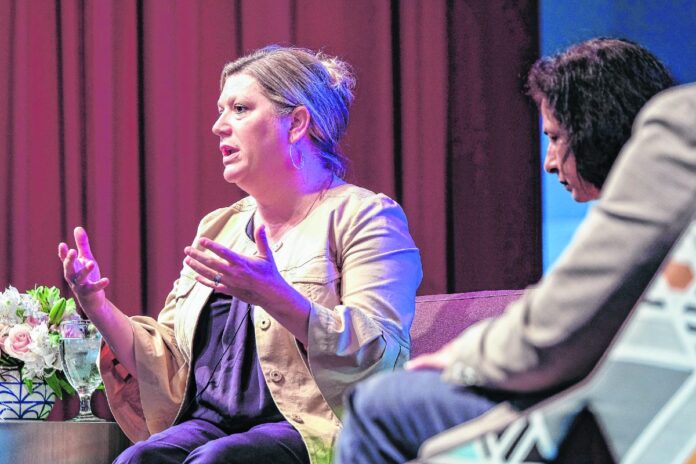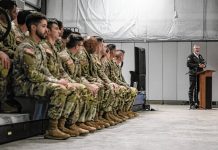
On a night celebrating the importance of human rights and discussing immigration, speakers at the Columbus Human Rights Commission’s annual dinner meeting shared several common messages about gaining greater understanding, getting involved personally and taking action.
Mayor Jim Lienhoop told the crowd of more than 300 people Thursday night at The Commons that a few months after Columbus City Council unanimously approved in 2015 an amendment to the city’s human rights ordinance that added sexual orientation, gender identity, age and veteran status as protected classes, the city and the commission were added to a lawsuit that challenges the legislative “fix” to the Religious Freedom Restoration Act (RFRA).
The lawsuit is ongoing, and the plaintiffs are vocal and active, the mayor said, but the city is committed to protecting the rights of its residents from those who would deny them.
“The city of Columbus will remain vigilant and will pursue the protection of those rights and the protection of our ordinance as long as we can,” Lienhoop said.
[sc:text-divider text-divider-title=”Story continues below gallery” ]Click here to purchase photos from this gallery
Lienhoop said it’s important to gather annually to reaffirm the community’s commitment to human and equal rights. Aida Ramirez, the commission’s director, said that the presence of those in attendance shows support for the commission, whose stated mission is to build and maintain an inclusive community.
When introducing the Rev. Clement T. Davis, pastor of St. Bartholomew Catholic Church, as the winner of the William R. Laws Human Rights Award, Zulkifly Yusuf of the Islamic Society of Columbus Indiana noted that Davis has always encouraged people to look outside their comfort zone.
That was true when Davis helped turn a negative moment in the community into a positive learning experience for people of different faiths.
On Aug. 31, 2014, parishioners at three Columbus churches — St. Bartholomew, East Columbus Christian and Lakeview Church of Christ — found graffiti spray painted on their buildings. The word “infidels” was spray painted on the churches in reference to a chapter and verse in the Quran, the Muslim holy book, police said at the time.
Soon after the vandalism incident, Davis worked with the local Muslim community to create a Christian-Muslim dialogue program called “In the Spirit of St. Francis and The Sultan.” The program, in which Davis was a participant, brought together seven Christians and seven Muslims over several months to discuss faith traditions. From that, lasting friendships have been created.
Davis noted the historical times of harmony and warfare between the two religions, and said friendships are better than warfare.
“My prayer (is) that our God who is all merciful and all compassionate will aid us in developing these same qualities of mercy and compassion in our nation and our communities and our families and in ourselves,” Davis said.
The two speakers for a panel discussion about immigration encouraged people to seek facts and talk personally with immigrants to gain a clearer and better understanding of the issue, so they can form their own opinions and not be influenced by myths.
Neeraj Kaushal, professor of social policy at the Columbia University School of Social Work in New York, said she advises people to listen to different viewpoints, to listen to other people’s stories.
“If somebody has a different viewpoint you have to listen to it and you have to sympathize with it, and then you have to think at what level can you agree with them, at what level can you change something?” Kaushal said.
Angela Adams, an attorney and the owner and manager of Carmel-based Adams Immigration Law LLC, said that immigration is a divisive issue swayed by politics, but there’s room for common ground.
Kaushal said myths exist that immigrants come to the U.S. for welfare or because of crisis in their birth countries, and they hurt the economy. However, she said they come to the U.S. because of economic opportunities.
“Economists and sociologist agree on one thing: overall immigration has a positive effect on the U.S. economy,” Kaushal said.
However, Kaushal and Adams noted that the U.S. immigration policy doesn’t align with its economic needs. The country’s economy is prospering, unemployment is low and more jobs are being created than there are people to fill them. However, the government limits the number worker visas needed that would provide more skilled workers, they said.
“You think they (immigrants) come here for welfare? No, they come here to work,” Kaushal said.
In addition to visa limits, U.S. policies regarding immigrants who have overstayed their visas or came to the country undocumented puts them in situation that subjects them to three- or 10-year bans if they were to leave the country and try to return legally. That, too, hampers employers, Adams said, and is an opportunity for improvement.
“A lot of people on both sides of the aisle support immigration reform. There’s a lot of gray area. It needs to work better,” Adams said.
Immigration and human rights are examples of issues that people locally can take action on, Adams said. Attending an event such as the Human Rights Commission’s annual meeting is a good start, she said, but people should look for ways to get involved, even taking their message to Congress.
The key, Adams said, is to learn more and “not fall prey to the bumper stickers and the sound bites.”
[sc:pullout-title pullout-title=”Essay, art winners” ][sc:pullout-text-begin]
The Columbus Human Rights Commission honored the winners of the J. Irwin Miller Art and Benjamin M. King Essay contests at its annual dinner meeting Thursday at The Commons. They are:
2019 J. Irwin Miller Art Contest
- Elementary School Division: Esther Michel, Parkside Elementary School
- Middle School Division: Kate Russell, St. Bartholomew Catholic School
- High School Division: No entries, no winner
2019 Benjamin M. King Essay Contest:
- Elementary School Division: Grace McMahon, St. Bartholomew Catholic School
- Middle School Division: Fareeha Parvin, Central Middle School
- High School Division: Maya Federle, Columbus East High School
[sc:pullout-text-end][sc:pullout-title pullout-title=”About the award” ][sc:pullout-text-begin]
The William R. Laws Award is named after the man who helped create the city’s human rights commission, and was a strong advocate of civil rights in the 1960s while he was pastor at First Presbyterian Church in Columbus.
[sc:pullout-text-end]




